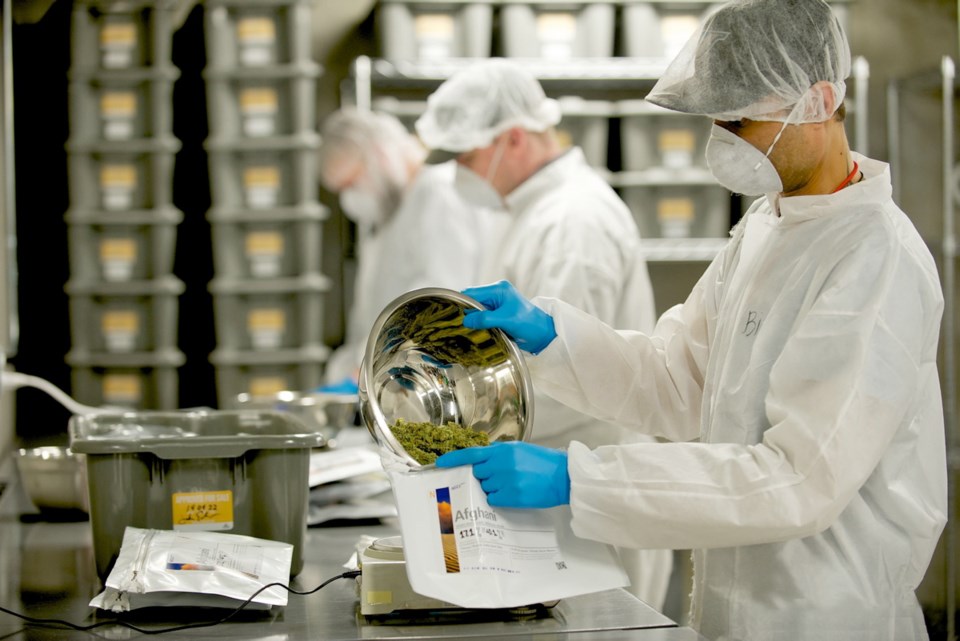Greg Engel, CEO of Tilray, said some physicians are asking for a fee of $50 for processing medical documents and others are looking for fees of $150 to $400 for referring patients to a licensed producer.
“We would never accept this in the pharmaceutical industry if a drug was prescribed specifically because a doctor was receiving payments from that company,” said Engel, a former pharmaceutical executive. “So it’s really concerning to us that this practice is going on in the medical cannabis industry.”
Tilray provided the Times Colonist with copies of unsolicited invoices received from two doctors, three clinics and two patient aggregators, which are consulting groups that work with health practitioners to provide a range of services to medical-marijuana patients.
The invoices request direct payment to verify patient information, most for $50 each, or a percentage of medical-marijuana sales.
Engel said he hasn’t had a request for payment from any doctors on Vancouver Island.
The practice is prohibited by the College of Surgeons and Physicians in both B.C. and Ontario.
Dr. Galt Wilson, senior deputy registrar for the B.C. college, said the agency has not received a formal complaint or report, but will be launching a formal investigation.
“We take it very, very seriously,” Wilson said. “It’s been absolutely prohibited for physicians to receive a kickback or payment from any kind of supplier or provider for decades.”
A doctor who contravenes the college policy by taking a kickback could face discipline.
“It’s not been proven that anyone has done this, but if they have, they are in contravention of long-established standards,” Wilson said.
Health Canada said in a statement Tuesday it is “concerned about reports that some physicians and other organizations (e.g. patient aggregators) may be charging fees as a part of the process for registering new patients seeking to access marijuana for medical purposes.”
The agency is looking into whether any licensed producers are involved in situations that may be a conflict of interest.
“Health Canada expects that all licensed producers will adhere to a high standard of ethical conduct,” the statement said.
Tilray recently left the Canadian Medical Cannabis Industry Association after its members refused to adopt a code of ethics that would prohibit the practice of making payments to anyone who brings them business.
The dozen members of the association were unwilling to approve such a code because “it became very, very clear that some members are involved in kickback schemes,” he said.
Tilray has started its own industry group, the Canadian Medical Cannabis Council, and has developed a detailed set of ethical guidelines.
Neil Belot, the executive director of the Canadian Medical Cannabis Industry Association, said in a statement Wednesday that members of the association provide Canadian physicians and/or clinics with “with compensation for participation in research and data collection initiatives designed to advance the clinical understanding of the potential therapeutic usefulness, risks and side effects related to authorized patients’ use of medical cannabis in the management of symptoms of various health conditions.”
Belot said the code of ethics proposed by Tilray “could have had the inadvertent effect of prohibiting members from conducting meaningful research and data collection initiatives.”
Engel said Tilray has lost a number of patients who had been purchasing its cannabis products for the last year after they were told that their doctors would not renew their prescription document with his company and they would “have to go to company X.”
“So this is the case where a specific producer of medical cannabis is being chosen over another company because of a payment that has exchanged hands, either a fee directly to the physician or indirectly through a clinic or patient aggregator group,” he said.
Engel believes that’s not how Health Canada envisioned the process when it changed its regulations, which left patients free to choose the producer and certain marijuana strains that would work best to alleviate pain and other symptoms related to their health conditions.
“It’s important to us that the medical cannabis industry is seen to be a legitimate, ethical program and that the use of medical cannabis in Canada is on par with prescription medication in Canada,” Engel said.
— With files from The Canadian Press



